Pediatric Sedation Dentistry – Willow Park, TX
Keeping Your Child at Ease
Through Treatment
Whether it’s time for your child’s first cleaning ever or it’s their tenth visit, Stroud Pediatric Dentistry is dedicated to keeping them safe and comfortable every step of the way. Through our varying levels of pediatric sedation dentistry in Willow Park, TX, including nitrous oxide, IV sedation, and general anesthesia, we can effectively and safely address all forms of fear or anxiety that your child may have. These methods are also ideal if your child has special needs, which we understand means providing additional accommodations that you won’t find in any dental office. Call our dental office to learn more about sedation and how it can help your child!
Why Choose Stroud Pediatric Dentistry for Sedation Dentistry?
- Nitrous Oxide, or "Happy Air," for Restorative Treatment
- IV Sedation in Office by Board Certified Medical Anesthesiologist
- General Anesthesia in an Outpatient Hospital Setting
Nitrous Oxide Dental Sedation
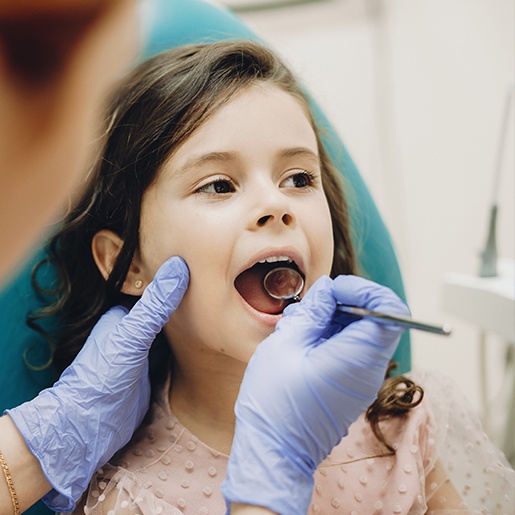
The mildest form of sedation available in dentistry, nitrous oxide, or "happy air," allows for fast-acting gas to be inhaled throughout the procedure. This gas is inhaled through a scented nasal mask that is worn by the patient, allowing for on-the-fly adjustments. Your child will still be awake during treatment, giving them a chance to let the dentist know if they are feeling comfortable. The effects of the gas disappear as soon as the mask is removed, so your child can continue their regular activities without worry.
Is My Child a Good Candidate for Nitrous Oxide?
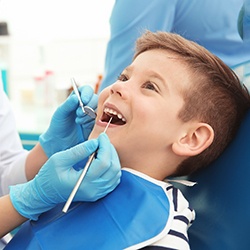
Does your little one typically express nervousness about visiting their dentist? Do they seem anxious when it comes to getting dental care? This is fairly common among children and can easily be addressed with nitrous oxide sedation. Other than helping them feel calm and comfortable during their appointment, this is a great option for young patients who:
- Are afraid of the dental office
- Struggle with dental sensitivity
- Have a fear of needles
- Have difficulty sitting still in a dental chair
- Find it impossible to control their movements
- Have trouble getting numb
- Struggle with a strong gag reflex
How Does Nitrous Oxide Work?
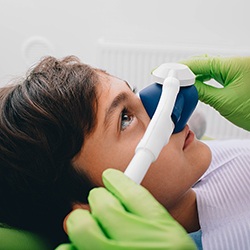
Before starting your child’s treatment process, our team will place a small nasal mask through which we’ll administer the nitrous oxide. We will be sure to adjust the levels of oxygen and nitrous oxide to keep your little one both relaxed and safe. After mere moments, your child should start to feel incredibly calm and even euphoric. Some of our patients report experiencing tingling sensations or light-headedness.
One of the biggest perks of nitrous oxide is that the effects wear off as easily as they set in. After removing the nasal mask and turning off the gas, your little one should begin to feel back to normal. The sedative won’t last very long, so your child will be able to continue their daily routine right after their visit!
Aftercare for Nitrous Oxide

The effects of nitrous oxide sedation generally don’t persist very long after we take off the nose mask. That said, we’ll still need to have your little one wait several minutes before leaving the office. Although most of our patients can go back to their normal schedule immediately after their treatment, your child should refrain from strenuous exercise for some time.
If your little one also had a local anesthetic used, they might feel numb for around two to four hours. Be sure they don’t scratch, bite, or accidentally injure their lips, tongue, and cheeks after their treatment. To ensure a smooth recovery, have them follow their dentist’s specific aftercare instructions to the letter.
IV Sedation Dentistry
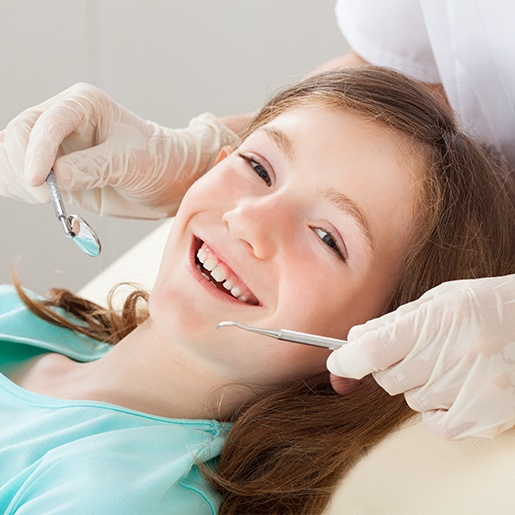
This method of sedation is more powerful than nitrous oxide, so it can be utilized when patients require a deeper level of anesthesia in the dental office. Stroud Pediatric Dentistry brings in a board certified pediatric anesthesiologist to administer the IV anesthesia, which puts your child to sleep while allowing them to continue breathing on their own. This means they should have no memory of the actual treatment, making it ideal for those with extreme levels of anxiety or fear of dental care. With IV sedation, all treatment is usually completed in one appointment at our dental office.
General Anesthesia
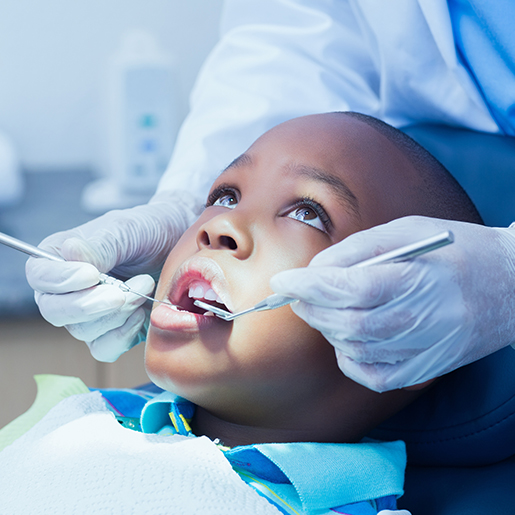
This is the strongest method of anesthesia and is generally needed only in patients that may be too young to have IV sedation or in patients with very extensive treatment plans. This type of sedation is performed in an outpatient setting at a local hospital or surgery center. Your child will be put all the way to sleep, allowing the dentists to obtain X-rays if necessary, and complete all needed treatment at once.
Sedation Dentistry FAQs
Is sedation dentistry safe?
For most patients, sedation dentistry is a perfectly safe option. In fact, it can often make dental appointments much easier and safer for patients of all ages.
Most patients handle nitrous oxide with no issues. Out of all the sedation dentistry options, it is well regarded as the safest for the largest amount of people.
Before deciding whether sedation is right for your child, Dr. Stroud or Dr. Ball will review their medical history and any current medications (both over the counter and prescription) to screen for any potential negative interactions.
While under sedation, your dentist and dental team will closely monitor your child’s vitals, including their blood pressure, oxygen levels, and heart rate.
Is sedation dentistry safe for kids?
If your child suffers from dental anxiety or fear of the dentist, sedation can help them get the oral health care they need while lowering their risk of having dental anxiety. This can lead to a healthier smile now and into adulthood.
Nitrous oxide is the type of sedation we most commonly use for children; however, IV sedation may also be used if your child requires a deeper level of anesthesia. This is often used with children who have severe anxiety or physical or mental impairments that could make dental care uncomfortable and otherwise unsafe.
Be sure to discuss any medications (both OTC and prescription) your child is taking, as well as any medical conditions they may have.
Often, nausea is the only side-effect of sedation. To lower your child’s risk of this occurring, it is best to restrict their food and fluid intake prior to their procedure.
What are the risks of sedation dentistry?
While sedation therapy is widely considered safe for most patients, it can still present serious risks for others. For example, patients with obstructive sleep apnea or who are taking certain medications could be more likely to develop complications from sedation.
Thus, be aware that everyone reacts differently to sedatives.
Though sedation dentistry is usually safe, some common side-effects which could potentially last for several hours may include nausea, headache, and grogginess (except for nitrous oxide).
Is sedation dentistry covered by insurance?
Most dental insurance plans consider sedation a luxury treatment and thus they do not typically cover the cost. However, there still may be some exceptions, such as for patients who have disabilities such as cerebral palsy, Parkinson’s disease, or autism, all of which could make it difficult for them to receive oral health care without sedation.
Another situation where sedation may be covered is if the procedure is very complex, such as multiple tooth extractions. It does not usually apply to procedures like root canals or fillings because they are usually deemed “routine treatments.”
Ultimately, every insurance plan is different, and yours may provide some sedation dentistry coverage. Our team can assist you in navigating your policy and help make your child’s sedation dentistry more affordable.
